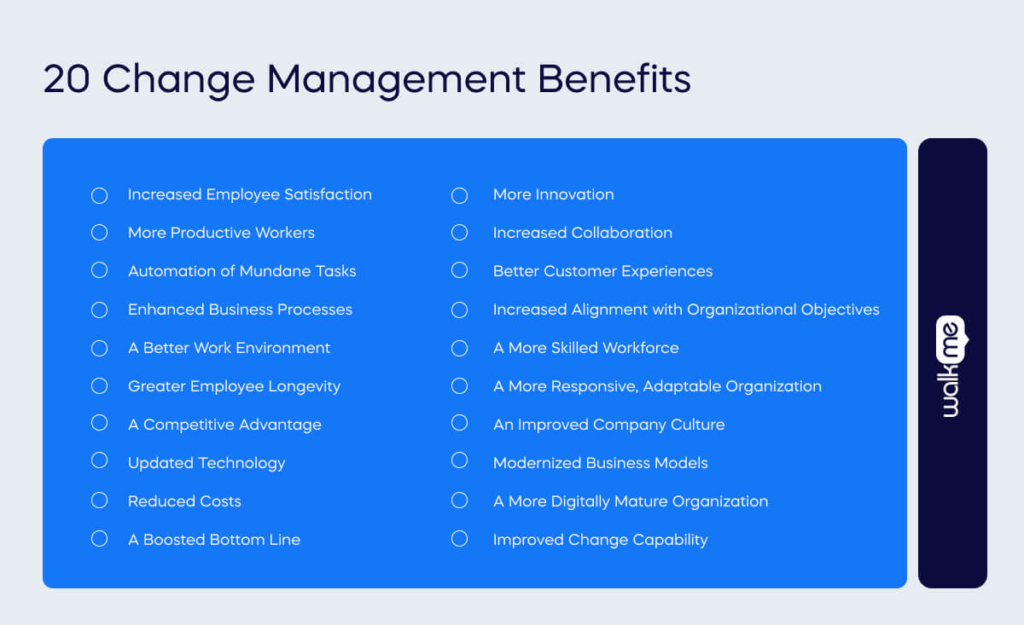Understanding change management benefits is essential for any organization considering a change.
You may be a change management professional, a business leader, or a concerned stakeholder.
Regardless of your role, understanding these change management benefits can help you:
- Understand the value of organizational change
- Make a case for change to stakeholders and leaders
- Decide whether or not change is right for your company
- Perform a cost-benefit analysis on your given program
Explore possibilities that you may not have known about.
Let’s get started.
In no particular order, here are 20 change management benefits:

1. Increased Employee Satisfaction
An effective change management process aims at improving the workplace.
This improvement can come in the form of better work processes, a revamped work culture, or something else.
Regardless, one result of a well-executed program is happier, more satisfied workers.
2. More Productive Workers
Another benefit of change programs – such as digital adoption programs and digital transformation efforts – is increased productivity.
Better digital tools, better work processes, and improved workflows increase output across the board.
3. Automation of Mundane Tasks
Today, many change programs are digital transformations.
This means, in many cases, automation of mundane tasks, including everything from data entry to telephone customer service.
4. Enhanced Business Processes
Each change program has a different objective.
In many cases, the objective aims at improving business processes, via automation, streamlined workflows, an improved work culture, reorganization, and so forth.
The results usually include better business processes – which are more cost-effective and efficient.
5. A Better Work Environment
A study by Google found that the biggest benefit seen in most change programs was an improved work environment.
This, in turn, contributes to many of the other benefits mentioned here, such as increased worker satisfaction and productivity.
6. Greater Employee Longevity
A more satisfied workforce is more loyal.
Employee longevity will increase, which positively impacts their contribution to the company’s top and bottom lines.
7. A Competitive Advantage
The biggest reason any company undergoes change is to improve its strategic position.
Successful change programs positively impact a company’s position in its marketplace, granting it a better competitive edge.
8. Updated Technology
Today’s digital transformation efforts often involve technological adoption.
Digital adoption and transformation endeavors help companies keep pace with today’s changing technological landscape.
These, in turn, contribute to many of the other benefits mentioned here.
9. Reduced Costs
Cost savings come with many change efforts.
Restructured business models, software deployment, and altered business processes often reduce operational costs.
10. A Boosted Bottom Line
An increased bottom line often results from any change program, either in the short-term or the long-term.
11. More Innovation
Change is usually driven by innovative thinking – a requirement in today’s fast-paced economy.
And because change and innovation go hand-in-hand, companies that change successfully are usually more innovative.
This, in turn, brings many of its own benefits.
12. Increased Collaboration
Change can be unsettling.
But it can also bring workers closer together. And people can learn better ways of communicating and working collaboratively.
13. Better Customer Experiences
Either directly or indirectly, successful change programs positively impact the customer experience.
And a better customer experience has a positive effect on the business as a whole.
14. Increased Alignment with Organizational Objectives
Change initiatives should aim to improve an organization holistically.
When successful, these changes help align the organization itself with the organization’s mission.
15. A More Skilled Workforce
Change efforts that involve new software also involve training and upskilling.
This, in turn, helps a workforce become more skilled and more valuable.
16. A More Responsive, Adaptable Organization
Changeable organizations are more adaptable.
And organizations that can adapt better will stay more competitive and resilient in today’s digital landscape.
17. An Improved Company Culture
Change efforts target employees, improving employee productivity and satisfaction.
But they can also focus on the company culture as a whole, influencing it in a direction.
This can improve morale and make it a more desirable work environment for employees – both new and old.
18. Modernized Business Models
Modernized business models – such as lean and agile – are common today.
Such contemporary business models are being adopted more frequently by innovative, change-driven companies.
19. A More Digitally Mature Organization
Digital maturity is another result of today’s digital age.
The more that companies change, the more likely they are to adopt digital technology, business models, and cultures.
20. Improved Change Capability
Another result of organizational change is an improved enterprise change capability.
Over time, organizational changes help an organization acquire more formalized, sophisticated change departments.
Conclusion
These are just 20 change management benefits – there are certainly others.
Many of the benefits that a change program confers are unique to that situation.
An organization that sets its sights on a new technology, for instance, will gain all the advantages of that technology. However, it is important to remember that organizational changes often grant many other benefits, such as those mentioned here.

